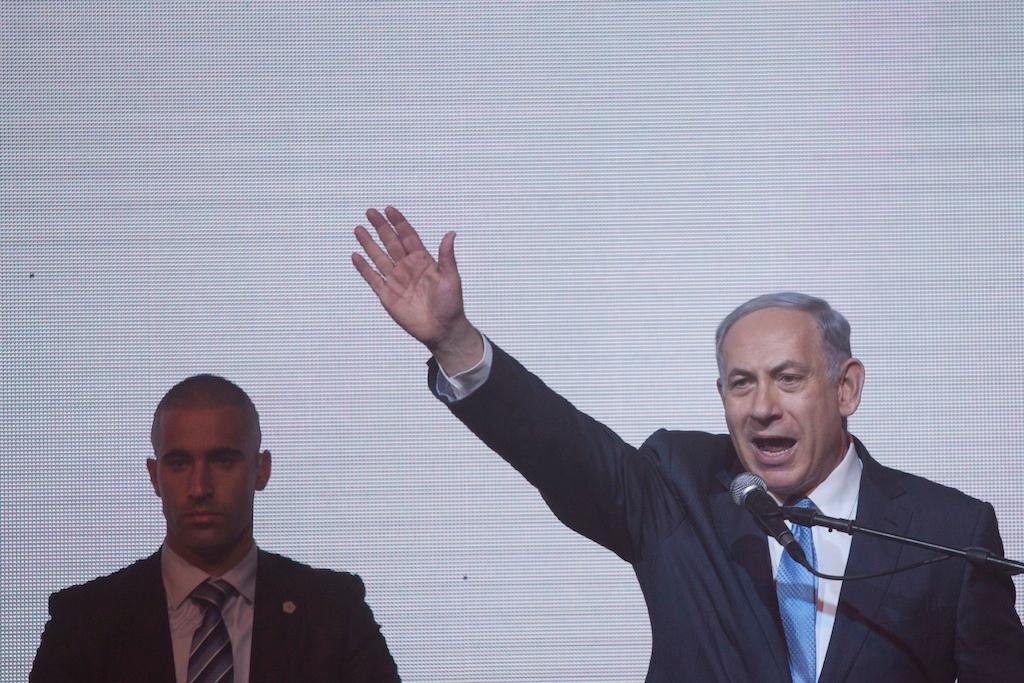Netanyahu wins Israel election after sharp shift to the right
Israeli Prime Minister Benjamin Netanyahu has been reelected.
JERUSALEM — Prime Minister Benjamin Netanyahu won a come-from-behind victory in Israel's election on Wednesday after tacking hard to the right in the final days of campaigning, including abandoning a commitment to negotiate a Palestinian state.
In a four-day pre-election blitz, Netanyahu made a series of promises designed to shore up his Likud base and draw voters from other right-wing and nationalist parties, including a pledge to go on building settlements on occupied land and saying that there would be no Palestinian state if he is re-elected.
With 99.5 percent of votes counted, Likud had won 30 seats in the 120-member Knesset, comfortably defeating the Zionist Union opposition on 24 seats, Israeli media said.
It amounted to a dramatic and unexpected victory — the last opinion polls published four days before the vote showed the Zionist Union with a four-seat advantage over Likud.
In a statement, Likud said Netanyahu intended to form a new government within weeks, with negotiations already underway with the pro-settler Jewish Home party led by Naftali Bennett, as well as with religious groups.
The critical party to get on side will be centrist Kulanu, led by former Likud member Moshe Kahlon, who won 10 seats, making him a kingmaker given his ability to side with either Netanyahu or the center-left opposition.
"Reality is not waiting for us," Netanyahu said. "The citizens of Israel expect us to quickly put together a leadership that will work for them regarding security, economy and society as we committed to do – and we will do so."
HARD ROAD AHEAD
If he manages to pull together a workable coalition, it would give Netanyahu a fourth-term in office, putting him on track to become Israel's longest-serving prime minister, a label held by the country's founding father, David Ben-Gurion.
While Likud is the largest party, the process of forming a coalition is likely to be difficult. It needs 61 seats in the Knesset and crossing that threshold will be challenging given the amount of division across Israel's political landscape.
Netanyahu's victory is also likely to prolong the country's testy relationship with US President Barack Obama, especially after his strident words on settlements and his backing away from the long-stated international goal of arriving at a two-state solution to the Israeli-Palestinian conflict.
Despite the numbers stacking up in Netanyahu's favor, Zionist Union leader Isaac Herzog said "everything is still open" and that he already had spoken to party leaders about the possibility of forming a government, although the arithmetic for him is much harder to achieve than for Netanyahu.
During much of the campaign, Netanyahu had focused on security issues and the threat from Iran's nuclear program, a message that appeared to gain little traction with voters.
The Zionist Union's focus on socio-economic issues, including the lack of housing and the high cost of living in Israel, appeared to be generating much more momentum, at least as far as opinion polls went.
But Netanyahu's tack to the right, playing up fears of the spread of Islamist groups, promising no concessions to the Palestinians and raising alarm about growing support for Arab-Israeli parties looks to have spurred his base into action.
From the Palestinian point-of-view, the results are a deep concern, raising the prospect of more settlement expansion on land they want for their own state in the occupied West Bank and East Jerusalem, as well as in Gaza.
If Netanyahu follows through on his pledges it would put him on a collision course with the Obama administration and the European Union, which has been weighing steps including trade measures to sanction Israel for its settlements policy.
The Palestinians will formally become members of the International Criminal Court from April 1 and have said they will pursue war crimes charges against Israel over its 48-year occupation of the West Bank and last year's Gaza war.
Pre-empting those steps, Israel has suspended the transfer of tax revenue it collects on the Palestinians' behalf, holding back around $120 million a month. That has crippled the Palestinian budget and led to deep pay cuts for state workers.
Saeb Erekat, chief Palestinian negotiator in peace talks with Israel that collapsed in April, told Reuters it appeared Netanyahu would form the next government.
Citing the Israeli leader's rejection of a Palestinian state, Erekat said: "Mr. Netanyahu has done nothing in his political life but to destroy the two-state solution."
